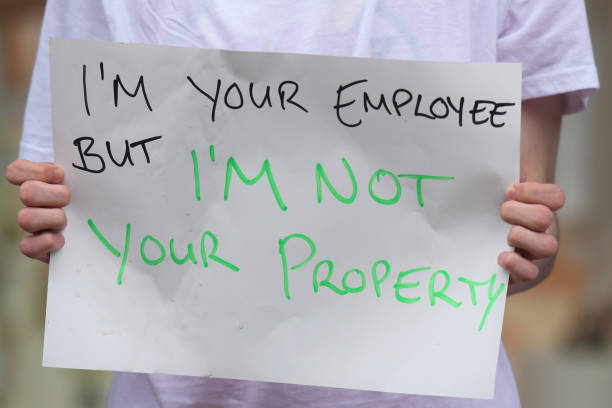
A recent unfair dismissal case heard by the Fair Work Commission has demonstrated that an oral resignation made in the heat of the moment does not mean that an employee has quit. The employer argued that the worker had voluntarily resigned. However, the worker argued that this simply was not the case, and that he had in fact been unfairly dismissed. How “worker wins unfair dismissal” and the context around it is important reading.Let’s take a look at this unfair dismissal case – Mr Tao Yang v SAL HR Services Pty Ltd [2023].
Warehouse worker claims unfair dismissal despite oral resignation
Tao Yang had started working for SAL HR Services Pty Ltd as a casual warehouse store person on 13 September 2021. On 14 February 2022, he had been promoted to a full-time position of the same role. SAL HR Services is a lighting wholesale business with warehouses across Australia. Mr Yang worked at the company’s smallest warehouse in Adelaide, where only four employees worked.
The central event of this unfair dismissal case took place on 6 February 2023. On this day, Mr Yang had turned up to work later than his scheduled start time. This caught the attention of SAL HR Services Operational Manager for South Australia, Li Wang. He was annoyed as he was the only other warehouse employee present. Mr Wang raised concerns about the late arrival and expected an explanation from Mr Yang.
Not long after, Mr Wang inspected the packages assembled by Mr Yang and found that the required information confirming the contents and order numbers was missing or inadequate. He expressed his concerns to Mr Yang, emphasising the importance of complying with warehouse procedures.
Employee implies that he wants to quit during tense altercation
The tension between Mr Wang and Mr Yang escalated as both men spoke in raised voices and pointed at each other. This was while expressing their viewpoints in Mandarin. Mr Yang felt he was being treated more strictly than others. While Mr Wang emphasised the need for compliance with company procedures. No threats, verbal or otherwise, were exchanged.Mr Wang also expressed his concerns about Mr Yang’s attitude. This being he was uncooperative behaviour and regular lateness for work. He sought assurance that Mr Yang would comply with warehouse procedures and cooperate in the future.
This, however, did not go down well with Mr Yang. In a gesture of frustration, he picked up and dropped a metal lighting track from a small height. Then, in a state of high emotion, he said something that would play a central part of this unfair dismissal case. Mr Yang said words to the effect that he had had enough of the situation and wanted to leave. And he also implied or stated his intention to quit his job. The matter of what Mr Yang said exactly was not entirely certain.

“Parting ways is the most appropriate course of action:” Employees oral resignation is accepted
Following his apparent oral resignation,Mr Yang demanded to speak with the General Manager, Mr Tang. Mr Wang phoned Mr Tang, handing the phone to Mr Yang. During their brief discussion, Mr Yang expressed that he had been treated unfairly. Mr Tang then advised him to speak with Mr Rong, the Administrator.
After Mr Yang left the workplace and went to his car, he directly phoned Mr Tang again. Mr Yang continued to protest his treatment. While Mr Tang reiterated the concerns around Mr Yang’s performance. No mention of resignation or dismissal occurred during this conversation.
After approximately 20 minutes outside the workplace, Mr Yang returned to the office and requested a discussion with Mr Wang in the carpark for a “calmer” atmosphere. Mr Wang agreed, and during the conversation, he stated that given Mr Yang’s ongoing behaviour, he would “respect [his]choice” to resign. He also said that it “seems that parting ways is the most appropriate course of action.”
Employer confirms employees resignation
Subsequently, Mr Rong, the Administrator, sent an “Acknowledgment and Acceptance of Resignation Notice” by express post to Mr Yang’s home address. The notice referred to Mr Yang’s “oral resignation.” It also cited concerns about his performance and the fact that he had “thrown packed products on the packaging machine and informed Li that you quit.”
Feeling that he had been unjustly treated, Mr Yang subsequently filed an unfair dismissal claim with the Fair Work Commission.
Employer makes its argument to the Fair Work Commission
SAL HR Services argued that the Fair Work Commission did not have the jurisdiction to deal with Mr Yang’s unfair dismissal claim. This was because the company believed that Mr Yang had voluntarily resigned and was therefore not dismissed. The company asserted that Mr Yang’s resignation was not forced and it denied that any dismissal was even considered by its General Manager.
If this argument was not to be accepted by the Fair Work Commission, SAL HR Services contended that Mr Yang’s dismissal was fair. It cited the fact that Mr Yang:
- Had been late for work on several occasions without providing an explanation. SAL HR Services said that it had provided him with multiple warnings about his tardiness.
- Had on numerous occasions failed to following instructions regarding certain tasks. SAL HR Services said that it had repeatedly warned Mr Yang that he should adhere to correct processes.
- Had been called into multiple performance management meetings in which his performance issues and lateness to work were raised.
- Had been provided with a sufficient opportunity to improve his work performance over time, given all the warnings he had received.

“Paradoxical:” employee pleads his case to the Fair Work Commission
In his unfair dismissal claim, Mr Yang told the Fair Work Commission that his dismissal was “unlawful” and unreasonable for several reasons. And he said that he was seeking financial compensation equivalent to 6 weeks’ wages.
Mr Yang told the Fair Work Commission that the General Manager had effectively told him that he had been dismissed. Namely, for not being able to cooperate with Mr Wang, being consistently late for work and because of his poor working attitude. He said that it was “paradoxical” of SAL HR Services to argue that he had submitted an oral resignation, while at the same time highlighting his behavioural issues.
Mr Yang argued that his dismissal had been harsh, unjust and unreasonable because:
- He had only been late “a handful of times” and that “other people were late all the time.”
- SAL HR Services had never provided him with a warning concerning his tardiness. Nor that it was “a serious problem that [SAL HR Services] would fire him for.”
- It was unfair that he was dismissed “for…attitude, but other people weren’t.”
- SAL HR Services did not provide him with the opportunity to improve his work performance.
Did employee resign or was he dismissed? Fair Work Commission provides ruling.
At Mr Yang’s unfair dismissal hearing, the first question the Fair Work Commission had to answer was whether he had in fact been dismissed. Or if he had orally resigned. Also, whether his resignation was of his own volition and not forced by SAL HR Services.The Fair Work Commission accepted that in one of his discussions with Mr Wang, Mr Yang had said words “to the effect that he intended to quit his job.” However, it was found that this was stated during a “highly emotional discussion,” and therefore, “it could not be said that an actual resignation was provided.”
The Fair Work Commission ruled that it “was not reasonable” for SAL HR Services to regard this as a resignation. It stated the fact that Mr Yang had returned to the workplace to discuss matters further with Mr Wang should have “created uncertainty” around whether he actually intended to resign.\It was therefore found that in accepting Mr Yang’s supposed resignation, SAL HR Services had brought his employment to an end at its own initiative. This meant that it was classified as a dismissal under the Fair Work Act 2009.

Was there a valid reason for dismissal?
The next question the Fair Work Commission had to answer was whether Mr Yang’s dismissal had been harsh, unjust or unreasonable. It was accepted that Mr Yang had exhibited some measure of poor performance and a history of lateness to work.
However, it was found that SAL HR Services never deemed these behaviours as sufficiently serious to warrant any form of disciplinary action or warning. The FWC also found that SAL HR Services did not consider the events of 6 February 2023 as serious enough to commence formal processes to support a dismissal.
The FWC therefore found that SAL HR Services did not have a sound, defensible or well-founded reason to dismiss Mr Yang.
Was employee provided with procedural fairness?
The Fair Work Commission next turned to whether Mr Yang had been notified of the reason for his dismissal. And if he had been provided an opportunity to respond to that reason. SAL HR Services’ argument that on 6 February 2023 Mr Yang had been engaged in a “performance discussion” was rejected. Rather, this was found to be an “unsatisfactory exchange of views” that took place in an “excited manner.”
The Fair Work Commission therefore ruled that Mr Yang had not received adequate notification of the reason for his dismissal. Nor that he was ever warned that his job was in jeopardy due to his alleged poor performance. The Fair Work Commission was also not satisfied that Mr Yang had been provided with the chance to respond to the reason for his dismissal.
Fair Work Commission rules that employee dismissal was unfair
Given all this evidence, the Fair Work Commission ruled that Mr Yang’s dismissal was harsh, unjust or unreasonable. As he did not wish to be reinstated to his job, SAL HR Services was ordered to pay Mr Yang $4,402.90 plus superannuation in financial compensation.
This decision demonstrates how the Fair Work Commission treats supposed resignations that are made in the heat of the moment. During the proceedings of this case, the Fair Work Commission provided clarification on how these sorts of resignations should be handled by employers.
It stated that an employer can typically treat a “clear and unambiguous resignation as a resignation.” However, if a resignation is tendered in the “heat of the moment or under extreme pressure,” it may be “unreasonable to assume” that it was intended as a resignation. The Fair Work Commission further stated that the employer may have the duty to “confirm the intention to resign” if they are later told by the employee that the resignation was not intended.

Worker wins unfair dismissal despite oral resignation
If you feel you have been unfairly dismissed from your job, get in touch with us immediately. Whether you were coerced into resigning. Or believe you were unjustly sacked for other reasons, we can offer top-notch representation.When you reach out to us, you can expect a completely free initial consultation. We will attentively listen to your situation and provide upfront guidance. It is crucial to take swift action in unfair dismissal cases. As you only have 21 days to file your claim with the Fair Work Commission.
Our team will support you throughout the process, ensuring that you enhance your chances of receiving the compensation you deserve. Although we are not lawyers or affiliated with any government agency such as the Fair Work Commission, we possess extensive knowledge of the complexities surrounding unfair dismissals. Employers recognise and fear our reputation, which is built upon our comprehensive understanding of the field. AWNA take pride in being available to assist clients seven days a week. We offer prompt services, settlements, and nationwide coverage across Australia. Harrassed, or subjected to adverse action, call now.
We are here to provide you with the information, advice and representation necessary to safeguard your workplace rights. Don’t allow unfair treatment to go unchallenged. We work on a national basis, including, Victoria, NSW, QLD
Contact us today at 1800 333 666 for a confidential and free conversation.






